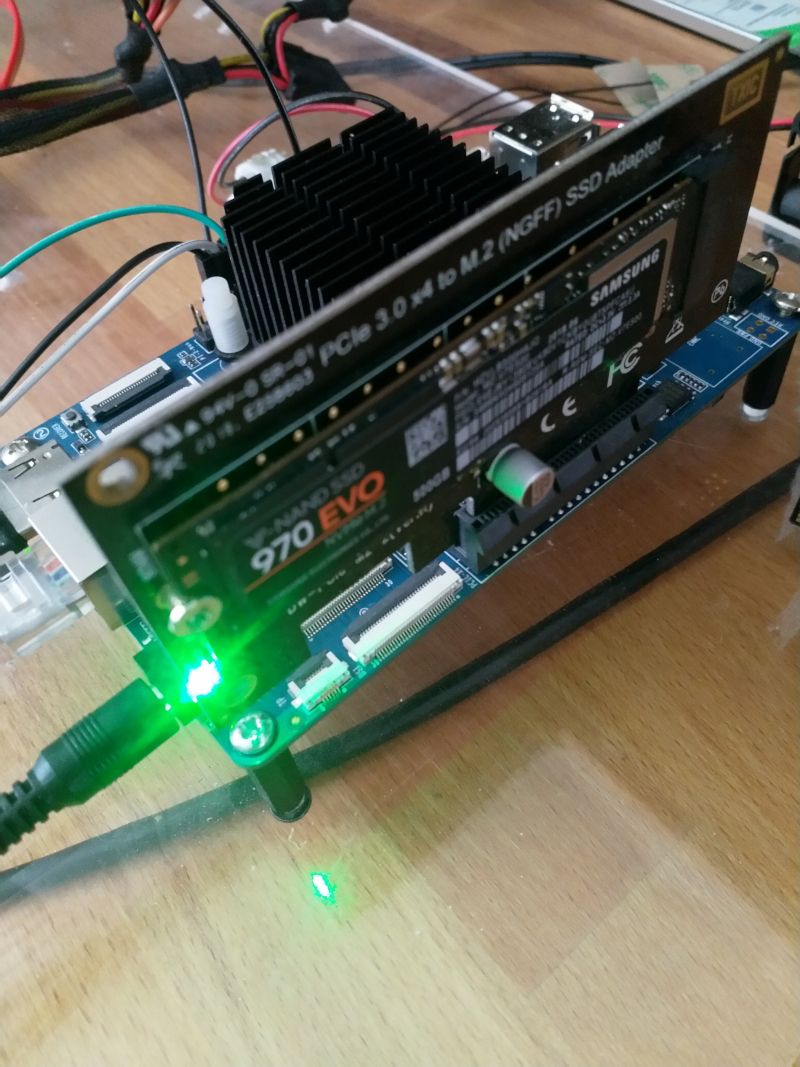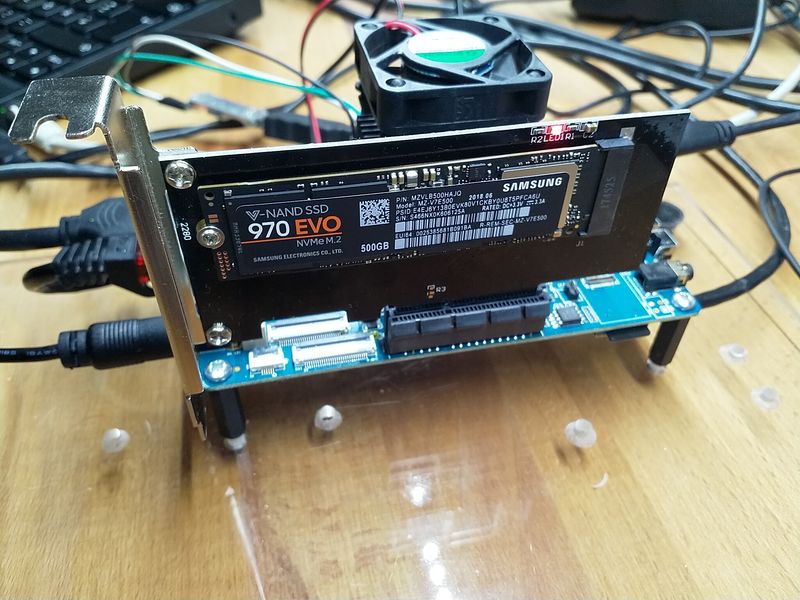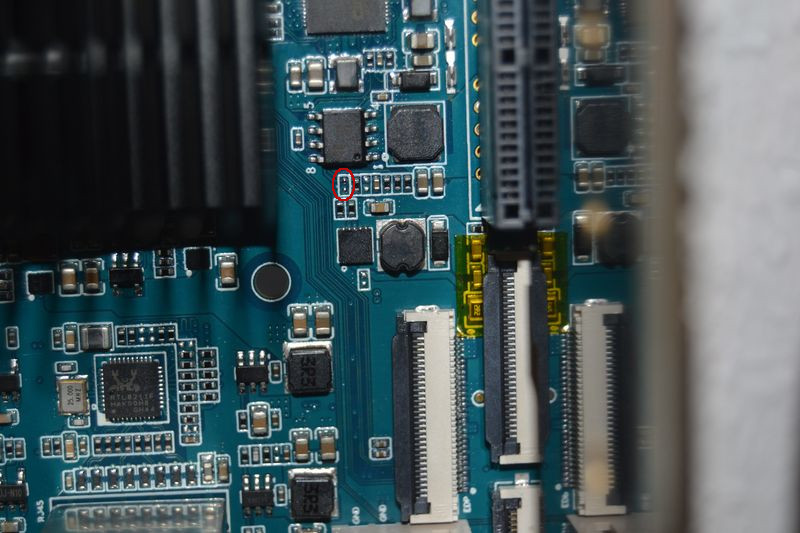ROCKPro64 - USB3 bootet von SSD!
-
Hmm, da bin ich heute doch nach langer Zeit mal wieder am Spielen, weil ich hier helfen wollte. Da nun der u-boot im SPI Flash war, kam ich auf die Idee, die Testplatte die hier rumliegt mal anzuschließen.
Es handelt sich um eine SSD von SanDisk mit 240GB, nix Besonderes
 Und was stelle ich fest?!? Das Ding bootet
Und was stelle ich fest?!? Das Ding bootet  Kur über die SSH Konsole einen Reboot durchgeführt, habe gedacht das das Zufall war, geht wieder. schaut sehr erstaunt
Kur über die SSH Konsole einen Reboot durchgeführt, habe gedacht das das Zufall war, geht wieder. schaut sehr erstauntHier das komplette Boot-Log: https://pastebin.com/asLuPk3G
Eingesetzter u-boot
U-Boot 2017.09-rockchip-ayufan-1035-gd646df03ac (Oct 26 2018 - 08:36:24 +0000)Das ist im Moment, der Aktuellste, den Kamil zur Verfügung stellt.
https://github.com/ayufan-rock64/linux-u-boot/releasesAuf der SSD ist folgendes System drauf.
rock64@rockpro64:~$ uname -a Linux rockpro64 4.4.154-1124-rockchip-ayufan-ged3ce4d15ec1 #1 SMP Mon Oct 22 20:59:41 UTC 2018 aarch64 aarch64 aarch64 GNU/LinuxDie Platte
rock64@rockpro64:~$ df -h Filesystem Size Used Avail Use% Mounted on udev 992M 0 992M 0% /dev tmpfs 200M 440K 199M 1% /run /dev/sda7 220G 1.3G 210G 1% / tmpfs 996M 0 996M 0% /dev/shm tmpfs 5.0M 4.0K 5.0M 1% /run/lock tmpfs 996M 0 996M 0% /sys/fs/cgroup /dev/sda6 112M 4.0K 112M 1% /boot/efi tmpfs 200M 0 200M 0% /run/user/1000Ich bin aktuell etwas verwundert, das es geht. Aber sehr wichtig wenn es jetzt endlich funktioniert.
-
Ich denke, ich habe das Problem erkannt.

Wenn man den Stecker nicht komplett in die USB3-Buchse des ROCKPro64 einsteckt, dann geht es einwandfrei. Diese Buchse scheint nicht optimal zu funktionieren. Ich kann den Fehler hier ziemlich gut reproduzieren, es benötigt aber noch ein paar Tests.
Also, wer mal testen will, den Stecker so weit einstecken, bis man leichten Widerstand spürt. Das sollte dann reichen
 Kann man dann mit einer UART-Verbindung kontrollieren, ob er das Device erkennt. Kann man da sehr schön sehen.
Kann man dann mit einer UART-Verbindung kontrollieren, ob er das Device erkennt. Kann man da sehr schön sehen.Bitte nagelt mich nicht drauf fest, ich hoffe das das noch jemand anders bestätigen kann. Morgen werde ich das noch mit einem anderen ROCKPro64 hier testen.
-
Leider ist das immer noch nicht DIE Lösung

Am ROCKPro64 erreiche ich folgende Geschwindigkeit
rock64@rockpro64:~$ sudo dd if=/dev/zero of=sd.img bs=1M count=4096 conv=fdatasync 4096+0 records in 4096+0 records out 4294967296 bytes (4.3 GB, 4.0 GiB) copied, 130.382 s, 32.9 MB/sOk, sieht nach USB2 aus. Mal am Haupt-PC testen, ob die Komponenten USB3 können.
frank@frank-MS-7A34:/media/frank/linux-root/home/rock64$ sudo dd if=/dev/zero of=sd.img bs=1M count=4096 conv=fdatasync [sudo] Passwort für frank: 4096+0 Datensätze ein 4096+0 Datensätze aus 4294967296 bytes (4,3 GB, 4,0 GiB) copied, 14,7509 s, 291 MB/sSieht gut aus. Und jetzt bin ich genauso schlau wie vorher....
Mein USB3-Adapter für die SSD
Bus 002 Device 005: ID 174c:55aa ASMedia Technology Inc. ASM1051E SATA 6Gb/s bridge, ASM1053E SATA 6Gb/s bridge, ASM1153 SATA 3Gb/s bridgeUnd raus. Ich hab keinen Plan, woran es liegt!?!?!?!
-
Da oben steht viel Bullshit
 Ich habe mich mal mit dem mechanischen Aufbau einer USB3 Buchse beschäftigt, bzw. dazu recherchiert. Auf dieser Seite ist ein klasse Bild, was das sehr gut verdeutlicht.
Ich habe mich mal mit dem mechanischen Aufbau einer USB3 Buchse beschäftigt, bzw. dazu recherchiert. Auf dieser Seite ist ein klasse Bild, was das sehr gut verdeutlicht.https://kompendium.infotip.de/usb-3-0.html
Abbildung 28. Dort sieht man das die USB3 Kontakte RX/TX und GND ganz hinten sind. Wenn ich den Stecker jetzt komplett einstecke, wird wohl versucht eine USB3 Verbindung aufzubauen, die ja im Moment aus irgendeinem Grund scheitert. Wenn ich den Stecker nun ein Stück raus ziehe, trenne ich die USB3-Verbindung und es kommt eine USB2-Verbindung zustande.
So mit ist mir jetzt einiges klarer, aber das Problem ist ungelöst

-
WLan auf der Konsole einrichten
Angeheftet Linux -
-
-
-
-
-
Benchmark Mainline 4.17.0-rc6
Verschoben Archiv -
Benchmarks
Angeheftet Verschoben Archiv


